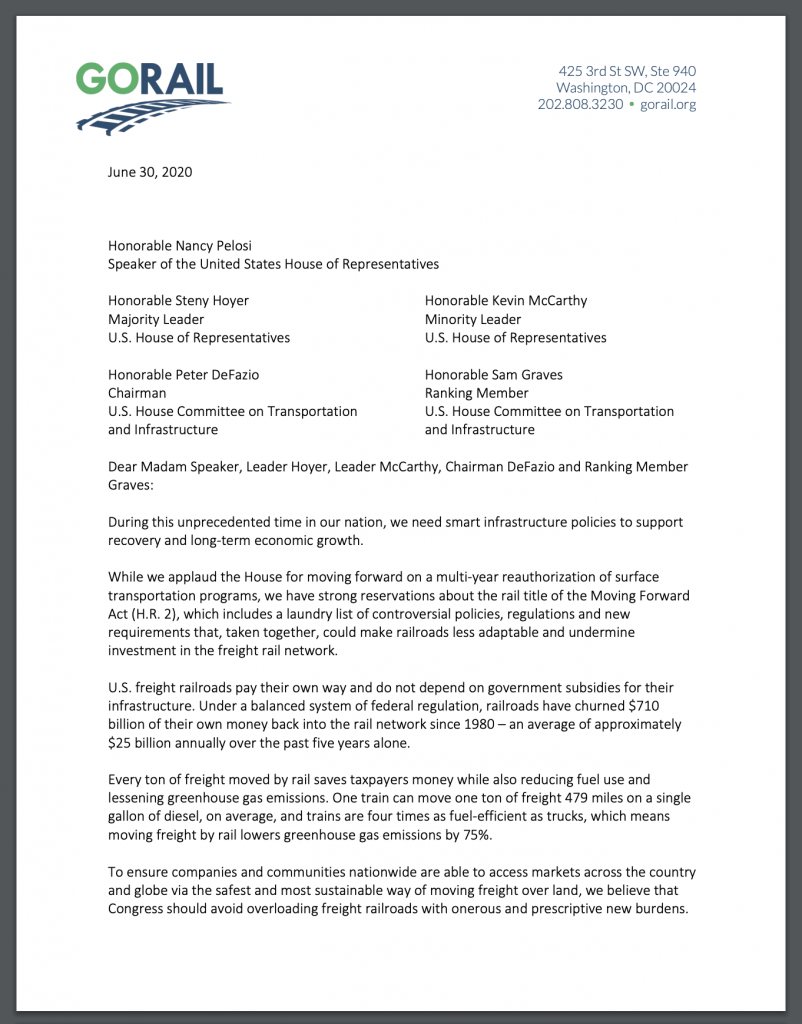Washington, D.C. — In a GoRail letter delivered yesterday to Reps. Pelosi, Hoyer, McCarthy, DeFazio and Graves, 34 community, business and economic development leaders across the nation called on the lawmakers to find a bipartisan fix for rail provisions in the Moving Forward Act (H.R. 2) that could undermine the nation’s freight rail network. The letter was timed to coincide with full House consideration of the legislation this week.
 The controversial policies, introduced as part of the House Transportation and Infrastructure Committee’s surface transportation reauthorization legislation in early June and passed along party lines in committee on June 18, include a litany of prescriptive mandates and new requirements. From operational directives and provisions that roll back efficiency to mandating one-sided studies and procedural obstacles that hinder innovation and potentially reduce future capacity, the rail sections of the Moving Forward Act ignore the lessons of smart, balanced policy.
The controversial policies, introduced as part of the House Transportation and Infrastructure Committee’s surface transportation reauthorization legislation in early June and passed along party lines in committee on June 18, include a litany of prescriptive mandates and new requirements. From operational directives and provisions that roll back efficiency to mandating one-sided studies and procedural obstacles that hinder innovation and potentially reduce future capacity, the rail sections of the Moving Forward Act ignore the lessons of smart, balanced policy.
Taken together, the provisions could erode railroads’ ability to adapt to rapidly changing market conditions, in turn undermining their capacity to make needed investments in the rail network so critical to the nation’s economic development and recovery.
With freight railroads already managing a 28% decrease in carloads from COVID-19, now is not the time for experimental policies that could place railroads at a competitive disadvantage and lead to more freight on the roads and subsequent increases in pollution and congestion.
The letter, which represents organizations and leaders in 20 states, emphasizes the freight rail success story since balanced regulations were introduced in 1980. The $710 billion that freight railroads have privately spent on network maintenance and growth since the Staggers Rail Act touch every part of the nation—extending economic connections for communities, saving taxpayers money, cutting congestion, and reducing greenhouse gas emissions.
While the letter signers applaud House leadership for working toward a multi-year reauthorization of surface transportation programs, they argue that these policymakers should work together to amend H.R. 2’s rail provisions to “reflect the nation’s bipartisan interest in preserving a healthy freight rail network.”
Infrastructure legislation has traditionally convened legislators across party lines—a recognition of how our foundational transportation systems build economic growth and quality of life. Now is not the time to break with that productive American tradition. We urge Congress to stick with a balanced approach to rail policy that continues to strengthen America’s safest and most sustainable way to move freight over land.


